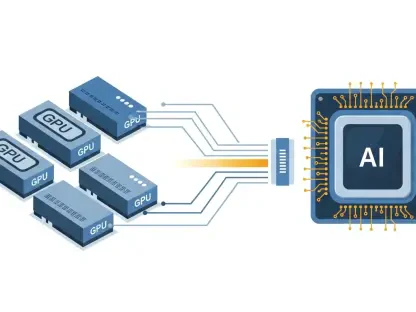In today’s rapidly evolving workplace, artificial intelligence (AI) stands as a transformative force, reshaping how employees perceive their roles and what they demand from employers to thrive in an increasingly tech-driven environment. With automation and intelligent systems becoming integral to daily operations, workers are no longer just adapting to change but actively expecting AI to enhance their professional lives in meaningful ways. From streamlining repetitive tasks to fostering personalized career growth, the influence of AI extends beyond mere efficiency, touching on deeper aspects like job security and ethical considerations. This shift signals a profound change in the employee-employer dynamic, where technology is both a tool and a catalyst for redefining workplace satisfaction. As companies navigate this landscape, understanding these evolving expectations becomes crucial for talent retention and fostering a future-ready workforce.
AI as a Tool for Workplace Enhancement
Elevating Productivity Through Automation
The integration of AI into workplace systems has fundamentally changed how employees approach their daily tasks, with a strong emphasis on automating mundane and repetitive activities to free up time for more strategic endeavors. Employees now expect AI tools to handle routine administrative duties, such as data entry or scheduling, allowing them to focus on creative problem-solving and innovation. Surveys indicate that a significant majority of workers believe AI can enhance their job satisfaction when implemented thoughtfully, reflecting a desire for technology to act as a supportive partner rather than a replacement. This expectation is pushing companies to invest in AI solutions that not only boost efficiency but also align with employee needs for meaningful engagement. As a result, the modern workforce is increasingly viewing AI as an essential component of a fulfilling work experience, driving a cultural shift toward tech-enabled productivity that prioritizes human potential over mechanical output.
Beyond the immediate benefits of task automation, AI’s role in enhancing productivity also extends to fostering seamless collaboration across teams and departments. Workers now anticipate generative AI assistants and intelligent tools to facilitate real-time communication, such as automated translation for global teams or smart summaries of lengthy meetings. This demand for frictionless interaction highlights a broader trend where technology is expected to break down barriers and enhance cross-functional teamwork. Industry insights suggest that companies adopting these tools are better positioned to meet employee expectations, as they create environments where collaboration is not just possible but effortless. The push for such advancements underscores a growing consensus that AI should serve as a bridge, connecting diverse skill sets and perspectives to drive collective success. This evolution in workplace dynamics illustrates how deeply embedded AI has become in shaping employee standards for efficiency and connectivity.
Personalizing Career Growth with AI
Employees today are increasingly looking to AI for tailored solutions that support their individual career trajectories, moving beyond one-size-fits-all approaches to professional development. Tools powered by AI, such as personalized learning paths and skill gap analytics, are becoming essential in helping workers identify areas for growth and access relevant training. Virtual mentors, driven by intelligent algorithms, offer real-time guidance, further customizing the learning experience to match personal goals. This shift reflects a broader expectation that technology should adapt to unique needs, empowering employees to take charge of their career progression with data-driven insights. As companies respond to this demand, the integration of AI into talent development strategies is proving to be a key differentiator in attracting and retaining top talent, signaling a move toward more individualized workplace support systems.
Another dimension of personalized career growth lies in AI’s ability to optimize work-life balance, a critical factor in employee satisfaction and retention. Intelligent schedulers, for instance, analyze workload patterns and personal preferences to suggest optimal task distributions, helping to prevent burnout before it occurs. Employees now expect such tools to be standard offerings, as they directly contribute to well-being by ensuring time for both professional responsibilities and personal priorities. This growing reliance on AI to maintain equilibrium between work and life underscores a deeper cultural shift, where technology is seen as a guardian of mental health and sustainable performance. Companies that prioritize these AI-driven solutions are finding that they not only meet employee expectations but also build loyalty by demonstrating a commitment to holistic support, reshaping the traditional boundaries of workplace care.
Addressing Challenges and Ethical Dimensions
Navigating Job Security Concerns
Amid the rapid adoption of AI technologies, job security remains a pressing concern for many employees, as automation continues to reshape the employment landscape with both opportunities and uncertainties. Economic reports estimate that a significant portion of white-collar tasks—potentially up to 40%—could be automated in the coming years, fueling fears of displacement among workers. In response, employees are demanding greater transparency from employers about how AI will impact their roles and what reskilling initiatives are in place to prepare for these changes. This expectation for clear communication and proactive support reflects a broader need for reassurance that technology will not undermine livelihoods but instead pave the way for new opportunities. Companies that address these concerns head-on are finding that trust and engagement improve, creating a more resilient workforce ready to adapt to technological shifts.
On the flip side, the potential for AI to create new roles offers a counterbalance to displacement fears, provided organizations invest strategically in workforce development. Projections suggest that AI could generate millions of new positions by the end of this decade, with estimates pointing to as many as 170 million roles globally. However, realizing this potential hinges on comprehensive upskilling programs that equip employees with the skills needed for emerging fields. Workers are increasingly vocal about expecting employers to provide such training, viewing it as a fundamental right in an era of rapid change. This dual narrative of risk and opportunity shapes current employee expectations, pushing companies to adopt forward-thinking strategies that balance automation with human capital investment. The focus on preparing for future roles through education and support is becoming a cornerstone of how businesses can meet workforce demands in an AI-driven world.
Prioritizing Ethical AI Implementation
As AI becomes more embedded in workplace processes, ethical considerations are taking center stage, with employees advocating for systems that prioritize fairness and transparency in their application. Concerns about bias in AI-driven performance evaluations or decision-making tools are prompting workers to demand safeguards that ensure equitable treatment across diverse teams. Data privacy also emerges as a critical issue, as employees expect their personal information to be handled with the utmost care, free from misuse or overreach. This growing emphasis on ethical AI reflects a broader societal push for technology to align with values of justice and accountability, compelling companies to build trust through responsible practices. Addressing these expectations is not just a moral imperative but a strategic one, as ethical missteps can erode employee confidence and harm organizational reputation.
Furthermore, the ethical deployment of AI is closely tied to economic outcomes, with research indicating that roles exposed to AI often see faster wage growth when fairness and transparency are prioritized. Employees are keenly aware of this correlation and are pushing for employers to embed ethical frameworks into technology adoption, ensuring that innovation does not come at the cost of equity. Companies that successfully navigate these demands are finding that ethical AI implementation enhances workplace morale and positions them as leaders in responsible innovation. This trend underscores a critical shift in employee expectations, where technology is judged not just by its capabilities but by the principles guiding its use. As the workplace continues to evolve, balancing technological advancement with ethical responsibility remains a defining challenge for organizations aiming to foster a committed and trusting workforce.
Reflecting on AI’s Transformative Impact
Looking back, the journey of AI integration into workplaces reveals a profound shift in how employees view their roles and the tools supporting them. The demand for productivity-enhancing automation, personalized career development, and ethical technology deployment stands as a testament to a workforce that embraces innovation while seeking balance and fairness. Companies that listen to these expectations and invest in upskilling, transparent communication, and responsible AI practices often find themselves ahead, building trust and loyalty among their teams. This era highlights that technology, when paired with human-centric policies, has the power to elevate job satisfaction and create new opportunities despite initial fears of displacement. Reflecting on these developments, it becomes clear that strategic foresight in addressing employee needs is the linchpin of successful adaptation to an AI-driven world. Moving forward, organizations should continue to prioritize seamless tech integration and robust ethical frameworks, ensuring that the future of work remains both innovative and inclusive for all.









